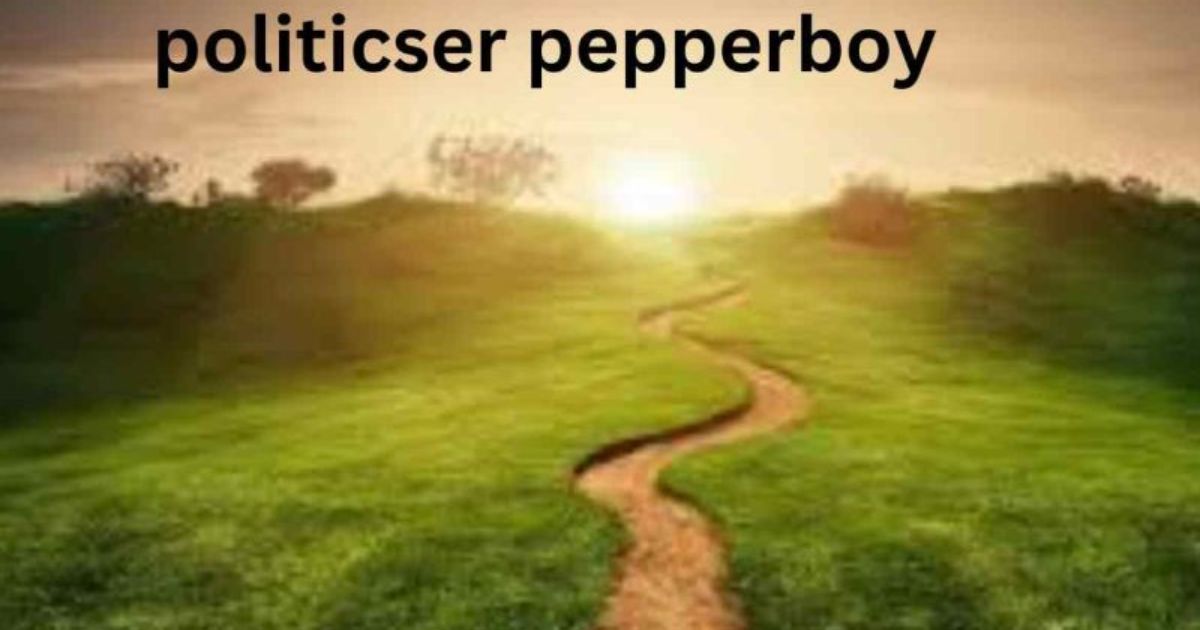Politics today can be both fascinating and overwhelming. In a world where information flows ceaselessly and opinions often clash, finding clear and insightful analysis is crucial.
Enter Politicser Pepperboy, a unique voice in the political landscape, known for his sharp insights and unconventional perspectives.
In this comprehensive blog post, we’ll delve deep into how Politicser Pepperboy analyzes modern politics, offering readers a fresh lens to view the current political climate.
Who is Politicser Pepperboy?
Politicser Pepperboy is a prominent political analyst known for his insightful and unconventional perspectives on modern politics. With a background in political science and economics, he blends academic rigor with real-world experience, offering fresh, nuanced takes on today’s most pressing political issues.
His approach challenges traditional left-right paradigms, focusing instead on the cultural and psychological factors driving political behavior. Pepperboy’s analysis is both accessible and thought-provoking, making him a unique and influential voice in contemporary political discourse.
A Brief Introduction to Politicser Pepperboy
Politicser Pepperboy isn’t just another political analyst; he’s a phenomenon in the realm of political commentary. With a background that marries academic rigor with real-world experience, he brings a unique blend of theory and practice to his analysis.
Pepperboy’s journey began in the halls of prestigious universities, where he studied political science and economics. His early work focused on understanding the underlying mechanisms of political systems, but it wasn’t long before he ventured into the public sphere, eager to apply his knowledge to real-world situations.
Politicser Pepperboy stands out because of his distinctive approach to analyzing modern politics. Unlike many commentators who stick to traditional left-right paradigms, he explores issues from multiple angles, often challenging conventional wisdom.
His ability to synthesize complex ideas into relatable narratives makes his work accessible to a broad audience, from political novices to seasoned experts.
Read This Post: Punti Salienti Di Stoccolma Countryside Drive & Vasa Museum From Nynashamn
Approach to Politics
Politicser Pepperboy’s approach to politics is both analytical and narrative-driven. He believes that politics isn’t just about policies and elections; it’s about the stories we tell ourselves as societies. His analysis often involves unpacking these narratives, examining how they shape public opinion and influence political outcomes.
For example, in his critique of the increasing polarization in American politics, Pepperboy doesn’t just blame the usual suspects like social media or partisan news outlets.
Instead, he digs deeper into the cultural and psychological factors that drive people to adopt more extreme positions.
He argues that understanding these underlying dynamics is crucial if we’re to find any meaningful solutions.
Analyzing the Political Landscape Today

In today’s political arena, polarization sharply divides public opinion, creating echo chambers that exacerbate conflicts. Social media amplifies this division, often prioritizing sensational content that deepens partisan divides.
Politicser Pepperboy provides a nuanced view, emphasizing the need for empathetic dialogue and cross-party collaboration to bridge these divides effectively.
Polarization in Politics
Polarization has become one of the defining features of modern politics, especially in the United States. It’s a phenomenon where the middle ground erodes, leaving society divided into opposing camps. This division affects everything from public discourse to policy-making, often leading to gridlock and a lack of consensus.
Understanding Polarization
Polarization isn’t just about political differences; it’s about the way these differences are perceived and acted upon. According to Politicser Pepperboy, polarization can be understood as a cycle: as people become more entrenched in their views, they seek out information that confirms their beliefs, which in turn makes them even more entrenched.
This cycle is fueled by social media, where algorithms often prioritize content that elicits strong emotional reactions, further deepening divides.
Politicser Pepperboy’s Perspective on Polarization
Pepperboy suggests that while polarization is a significant issue, it’s not an inevitable one. He argues for a more nuanced approach to political discourse, one that encourages empathy and understanding rather than confrontation. “We need to focus on the common ground,” he writes, “even if it’s just a small patch of shared values.”
One of Pepperboy’s key recommendations is to reform how political debates are conducted. He advocates for formats that prioritize dialogue over monologue, where participants are encouraged to listen and respond to each other’s points rather than simply broadcasting their own views.
The Role of Social Media in Politics
Social media has revolutionized how we communicate, but its impact on politics has been a double-edged sword. On the one hand, it has democratized information, giving everyone a platform to express their views. On the other hand, it has also contributed to the spread of misinformation and the rise of echo chambers.
Social Media’s Influence on Political Discourse
Politicser Pepperboy is acutely aware of the influence social media wields in modern politics. He notes that platforms like Twitter and Facebook have become the new public squares, where political ideas are debated, shared, and amplified. However, he also warns that these platforms are not neutral; they are designed to maximize engagement, often at the expense of thoughtful discourse.
For instance, the rapid spread of misinformation during election cycles is a major concern for Pepperboy. He argues that social media companies have a responsibility to mitigate this problem, whether through better fact-checking mechanisms or by altering the algorithms that promote sensationalist content.
Pepperboy’s Predictions for the Future of Social Media in Politics
Looking ahead, Politicser Pepperboy believes that the role of social media in politics will continue to evolve. He predicts that we may see a backlash against the current model of engagement-driven content, leading to the rise of new platforms that prioritize quality over quantity.
Additionally, he foresees a greater emphasis on digital literacy, as people become more aware of the ways in which social media shapes their perceptions of reality.
Key Issues in Modern Politics
Key Issues in Modern Politics are diverse and complex, reflecting the multifaceted nature of contemporary society. Major concerns include economic inequality, which exacerbates social divisions, and climate change, posing urgent challenges for policy and action.
These issues intersect, influencing global stability and individual livelihoods. Addressing economic inequality requires policies that promote fair wealth distribution and equal opportunities.
Meanwhile, tackling climate change demands robust environmental policies and international cooperation. Understanding and solving these issues is crucial for creating a more equitable and sustainable future for all.
Economic Inequality
Economic inequality is one of the most pressing issues in modern politics. The gap between the rich and the poor has been widening for decades, leading to social unrest and political instability.
Understanding Economic Inequality
Economic inequality refers to the uneven distribution of wealth and income within a society. This issue is not just about the difference between the rich and the poor, but also about the lack of opportunities for those at the bottom to improve their situation. Politicser Pepperboy argues that economic inequality is both a cause and a consequence of political dysfunction.
Politicser Pepperboy’s Analysis of Economic Inequality
Pepperboy takes a holistic approach to analyzing economic inequality. He examines the role of policy decisions, such as tax cuts for the wealthy and cuts to social programs, in exacerbating the problem.
He also looks at broader economic trends, such as globalization and automation, which have disproportionately benefited the wealthy while leaving many workers behind.
To address economic inequality, Pepperboy advocates for policies that promote greater economic justice. This includes progressive taxation, increased investment in education and healthcare, and stronger labor protections.
He also emphasizes the importance of political will, noting that meaningful change will only come when enough people demand it.
Climate Change and Environmental Policy
Climate change is another critical issue that looms large over modern politics. The science is clear: if we do not take significant action to reduce greenhouse gas emissions, the consequences will be catastrophic.
The Political Debate Surrounding Climate Change
Climate change has become a highly politicized issue, with deep divisions between those who advocate for urgent action and those who deny the problem or downplay its severity.
Politicser Pepperboy argues that this polarization has made it difficult to achieve the kind of broad-based support needed to implement effective climate policies.
Pepperboy’s Perspective on Environmental Policy
Pepperboy is a strong advocate for aggressive action on climate change. He supports policies such as carbon pricing, investment in renewable energy, and stricter regulations on emissions.
However, he also recognizes the political challenges involved in implementing these policies. He argues that successful climate policy must be framed not just as an environmental issue, but as an economic and social one as well.
For example, Pepperboy points out that transitioning to a green economy can create jobs and stimulate economic growth, particularly in sectors like renewable energy and energy efficiency.
He also emphasizes the importance of ensuring that the costs of climate action are borne equitably, so that low-income communities are not disproportionately affected.
Global Politics and Nationalism
Nationalism is on the rise around the world, leading to a shift in global politics. This trend has significant implications for international relations, trade, and human rights.
The Rise of Nationalism
Nationalism is characterized by a strong identification with one’s own nation, often to the exclusion of others. In recent years, we have seen a resurgence of nationalist movements, from Brexit in the United Kingdom to the election of nationalist leaders in countries like Hungary, Brazil, and the United States.
Politicser Pepperboy’s Analysis of Nationalism
Politicser Pepperboy views the rise of nationalism as a response to the challenges of globalization. As economic and cultural changes have disrupted traditional ways of life, many people have turned to nationalism as a way to reclaim a sense of identity and control.
However, Pepperboy warns that this trend can have dangerous consequences, leading to xenophobia, authoritarianism, and conflict.
To address the challenges posed by nationalism, Pepperboy advocates for a more inclusive form of politics that recognizes the legitimate concerns of those who feel left behind by globalization, while also promoting the values of democracy, human rights, and international cooperation.
The Impact of Politicser Pepperboy’s Analysis on Modern Political Thought
Politicser Pepperboy’s analysis has significantly influenced contemporary political thought by offering a fresh perspective on complex issues. His nuanced insights challenge conventional wisdom, encouraging deeper reflection on topics like polarization, social media’s role, and nationalism.
Through his accessible and thought-provoking commentary, Pepperboy has shaped how both scholars and the public approach modern political discourse. His work invites readers to question prevailing narratives and engage with politics more critically.
Influence on Political Discourse
Politicser Pepperboy’s analysis has had a significant impact on political discourse. His work is widely read and cited by academics, policymakers, and journalists alike. His ability to make complex ideas accessible to a broad audience has helped to shape the way we think about some of the most pressing issues of our time.
Public Reception
Pepperboy’s work has resonated with a wide range of audiences. For political enthusiasts and students, his analysis provides a fresh perspective on familiar issues. For policymakers, his recommendations offer practical solutions to some of the most difficult challenges facing our society. And for the general public, his writing serves as a guide to navigating the often confusing world of politics.
Criticisms and Controversies
Like any influential thinker, Politicser Pepperboy has faced his share of criticisms. Some argue that his analysis is too idealistic, while others contend that he underestimates the difficulties of implementing his recommendations. However, Pepperboy has always welcomed debate and is quick to engage with his critics, seeing it as an opportunity to refine his ideas.
Conclusion
Politicser Pepperboy’s analysis of modern politics offers a much-needed antidote to the often shallow and polarized discourse that dominates today’s political landscape. By taking a deep, nuanced look at the issues that matter most, he provides readers with the tools they need to understand the complexities of the world around them.
In a time when politics can feel overwhelming and confusing, Pepperboy’s work is a reminder that thoughtful analysis and open dialogue are more important than ever. Whether you’re a seasoned political observer or just beginning to explore these issues, there’s something to be gained from engaging with Politicser Pepperboy’s insights.

